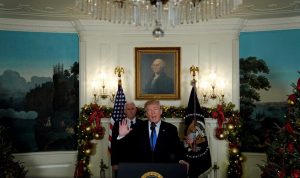As a quick response to complaints and observations by readers who said it was until the end they discovered the two opinions here to be different arguments, this is to point out that a the background was provided in the first installment. It was assumed that readers would normally start from the first installment. That is still advisable but the two pieces here argue in different directions. Here is how the pieces were introduced in the first installment: It is along that line that Intervention arraigns these three very revealing pieces on Trump’s pronouncement of Jerusalem as Israel’s capital, all of them reproduced from The Atlantic Daily, the US based online newsletter. The first piece by Emma Green, a lady reporter for the paper provides the general background. The second one by Einat Wilf, introduced as a former member of the Israeli Knesset, (the Israeli Parliament) stands by Trump while the third is by Gary Burge, a conservative former professor of Biblical Studies at Wheaton College but who now teaches at Calvin Theological Seminary. He stands opposed to Trump. Read on:

President Trump
Finally, a President Who Looks at Jerusalem Logically
By Einat Wilf
It’s just too bad Trump left out one important detail.
President Trump was correct when he said Wednesday that recognizing Jerusalem as Israel’s capital is “nothing more nor less than a recognition of reality—it is also the right thing to do.” In fact, the U.S. decision to recognize Jerusalem as Israel’s capital is 68 years overdue.
Jerusalem was established as the capital of the newly independent state of Israel on December 13, 1949. This was Jerusalem west of the ceasefire line delineated at the end of the war for Israel’s independence, later to be known as the pre-1967 line. This part of Jerusalem included Jewish residential neighborhoods built in preceding decades. There was nothing holy about this part of Jerusalem. By the end of the war the holy and ancient sites were actually east of the ceasefire line: the entire Old City, including the sites holiest to the Jewish people. The Temple Mount, the Wailing Wall, and the Jewish Quarter all came under Jordanian control, and Jews were denied access to these sites.
The United States recognized the State of Israel upon its independence, so it should have been straightforward for the U.S. to recognize Jerusalem as Israel’s capital and to establish its embassy there. If anything, it is the Jordanian annexation of the Old City and the way Jews were denied access that should have led to international consternation (it didn’t).
Why didn’t the U.S. and all other countries recognize residential, non-holy, west-of-the-armistice-line Jerusalem as Israel’s capital? At the time the U.S. was still attached to an idea, proposed in the United Nations partition resolution of 1947, that the vast area of greater Jerusalem (including residential neighborhoods) as well as Bethlehem should be a “Corpus Separatum,” a separate area that would be governed by the international community.
This fiction never existed anywhere but on paper. It never existed because the Arabs rejected the partition proposal and started a war to prevent it from being realized. When they lost that war, Jerusalem west of the armistice line became Israel’s, and Jerusalem east of the line came under Jordanian occupation and entered an extended period of disputed claims. So the U.S., while recognizing Israel within the armistice lines, chose a policy that held the status of Israel’s capital hostage to a fiction that never had a chance of existing.
When Israel captured the eastern part of Jerusalem in 1967, during the Six-Day War, it moved to unite the Old City to the east with the residential city to the west, and in addition annexed dozens of Arab villages to create a massive municipal area that became what many Israeli politicians call “undivided” or “united” Jerusalem. This was indeed a controversial move, especially as it was followed by massive building of Jewish residential neighborhoods in that annexed area; this move continues to not be recognized by any country to this day. It is also controversial within Israel, where many Israelis continue to support the possibility that a future Palestinian state would have its capital in the eastern part of Jerusalem.

Professor Condoleezza Rice, former American Secretary of State who was used to saying that she is a Realist and that power matters.
As the fiction of the “Corpus Separatum” faded from memory, Israel’s annexation of the areas east of the 1967 line became the new reason for not recognizing any part of Jerusalem as Israel’s capital. In this way, the U.S. has been punishing Israel twice: It has been denying any legitimate claims Israel had in Jerusalem east of the armistice line, including with respect to the Jewish holy sites in the Old City and the Jewish Quarter, and, until Trump’s announcement, would not acknowledge that at the very least, west of that line, Jerusalem is legitimately Israel’s capital.
Trump’s declaration finally puts an end to this nonsensical policy. By dismissing the fiction of the “Corpus Separatum” at last, the U.S. can stop denying Israel, alone among the nations, a basic national sovereign right to establish its capital in undisputed territory.
Trump used only the ambiguous term “Jerusalem” in his speech, saying, “We are not taking a position on any final status issues, including the specific boundaries of the Israeli sovereignty in Jerusalem or the resolution of contested borders. Those questions are up to the parties involved.” It would have been better if Trump had specified that the U.S. is only recognizing Israel’s capital in Jerusalem west of 1967 line—in other words, that the U.S. is simply ending the illogical policy that holds the undisputed status of Jerusalem west of the armistice line hostage to the ongoing dispute over Jerusalem east of that line.
Nevertheless, if the U.S. continues to declare that Jerusalem’s final borders should be negotiated (meaning that it leaves open the possibility of a Palestinian capital in the eastern part of Jerusalem), and if the U.S. refrains from describing Israel’s capital as “united” or “undivided” Jerusalem, and if the U.S. continues to refrain from taking any steps that recognize Israel’s annexation of the territories east of the 1967 line, and assuming that the new embassy will be located in Jerusalem west of that line—then Palestinian, Arab, and Muslim leaders who are not itching for violence should be able to legitimately say that Trump’s declaration effectively changes nothing.
In fact, if Palestinian, Arab, and Muslim leaders object to the declaration and threaten violence, they should be called on to specify the cause of their anger. Which Jerusalem do they deny Israel’s right to name as its capital? If it is Jerusalem east of the 1967 line, Trump’s declaration does nothing to change that: The U.S. still does not recognize Israel’s annexation of the territories east of the line. The status of that part of Jerusalem is up for negotiations. If the anger is about residential, non-holy Jerusalem within the pre-1967 line—the capital of the State of Israel since its early beginnings—then it implies a blanket refusal to accept the legitimacy of Israel within any borders. To that, the U.S. should not bow.
Ultimately, attaining peace requires that Palestinians and the Arab world accept that the Jewish people have a legitimate right to self-determination in their homeland. This means acknowledging the deep connection between the Jewish people and Jerusalem. It means accepting that the Jews are not foreigners in the land and that this is the homeland of not one, but two peoples. Based on such an acknowledgement, Israelis and Palestinians can then negotiate an agreement to share Jerusalem so that it becomes the capital of both Israel and Palestine, with religious access for all.

This graphic is labelled in the original as “A view of the Dome of the Rock, the Islamic Shrine located in the Old City of Jerusalem”
You Can Be an Evangelical and Reject Trump’s Jerusalem Decision
By Gary Burge
Conservative evangelicals may see the embassy move as in line with their reading of scripture. But there’s more than one way to read scripture—and more than one scripture to read.
Few developments could have excited President Trump’s evangelical base more than his intention to move the U.S. embassy from Tel Aviv to Jerusalem. This base came through for him in the 2016 election, with 81 percent of white evangelicals voting for him. When he promised during his campaign that moving the embassy was high on his agenda and even said it would be one of his first acts as president, many evangelicals cheered.
But other evangelicals—myself included—were cautious, viewing this move as an idea that needs to be left on the shelf. And they are worried now. Despite media portrayals giving the impression that evangelicals have one point of view when it comes to Israel, in reality there is a wide range of perspectives.
Some conservative evangelicals have built a remarkable theology around the modern state of Israel. It’s as if a biblical story has come alive again from the scriptures. In the Hebrew Bible (the Christian Old Testament), Jerusalem was established as Israel’s capital by King David about 1,000 years before Christ. Notwithstanding various wars and a Babylonian exile that led to the loss of the city, Jerusalem remained Israel’s de facto capital in the Jewish imagination. Even in the New Testament, Jerusalem is assumed to be Israel’s capital. But another war in 70 A.D. led to a longtime loss of the city. Modern Israel did not recapture Jerusalem until 1967.
The key to understanding this perspective is to recognize that these conservative evangelicals are building a bridge from ancient biblical Israel to the modern secular State of Israel. So, promises made almost 4,000 years ago to Abraham apply to the modern Israeli state. “The whole land of Canaan, where you now reside as a foreigner, I will give as an everlasting possession to you and your descendants after you,” God says in Genesis 17:8. For these evangelical interpreters, a verse like this one is not just something ancient; it provides a political mandate for Israel’s privileges today. And Genesis 12:3, “I will bless those who bless you and whoever curses you I will curse,” originally intended as a word of protection for Abraham’s tribe, now can become a mandate for anyone living today. We are obligated, the argument runs, to bless modern Israel. In the U.S., blessing Israel means recognizing its sole ownership of Jerusalem.
These evangelicals’ perspectives stem partly from a high regard for the Bible and its story about the fate of the Israelites, which has led to an outsized fascination with Judaism. They believe that Israel has a unique place in history as God’s special people, so Israel deserves deferential treatment—and Jerusalem deserves the same. For some, Israel enjoys an exceptionalism that sets it apart from the entire world. There are even evangelicals who believe that promoting the importance of Jerusalem is one more building block in the fulfillment of prophecies that sets the stage for the Second Coming of Christ. The average conservative evangelical is filled with a tangle of commitments that are often tough to sort out. She just knows that if Israel wants something—in this case, Jerusalem—Israel deserves to have it.
The legitimacy of this position rests entirely on the legitimacy of the theological move from antiquity to the 21st century. If the theological bridge can be built, modern secular Israel enjoys the biblical promises and privileges no other nation can enjoy, including the privilege of having all of Jerusalem despite an international outcry. The problem is that this bridge is fundamentally unsound. It uses the Bible for modern political ends that many of us find illegitimate.
Numerous evangelicals like me are less enamored of the recent romance between the church and Republican politics, and worry about moving the U.S. embassy. For us, peacemaking and the pursuit of justice are very high virtues. We view the ethical teachings of the scriptures as primary, and recognize that when biblical Israelites failed in their moral pursuits, they were sorely criticized by the Hebrew prophets and became subject to ejection from the Holy Land. Amos 5:24 shows that even the use of the Jerusalem Temple can be problematic to God: “Take away from me [God] the noise of your songs; I will not even listen to the sound of your harps. But let justice roll down like waters and righteousness like an ever-flowing stream.” Many of us look at modern Israel today and see a country that Amos would barely recognize. How, we wonder, can anyone build a bridge from ancient Israel to modern Israel today? Amos would hardly recognize in Tel Aviv a city based on biblical ideals.
What’s more, anything that detracts from the movement toward a peaceful resolution of conflict must be avoided. We do not promote what we call the “territorialism” of the Bible. We anchor our thinking not in the Old Testament’s land-based promises, but in the gospel, where the tribal or local theologies about Israel become global and universal, welcoming all people from every tribe and every land into a divine promise of blessing. Paul can refer to gentiles as children of Abraham (Romans 4:11) because it’s through faith, not ethnic lineage, that one gains access to the blessings of God. This shift in emphasis, which challenges the exclusivity of any one tribe and universalizes blessing, explains the world-mission of the ancient church and the inclusion of gentiles in Jesus’s Jewish messianic movement. From this vantage, arguments for ethnic land claims—such as disputes over Jerusalem—sound foreign.

Tel Aviv: Not the Biblical Israel
Finally, although there is little doubt that Jerusalem is the historic capital of Biblical Israel, the ancient world did not view “capitals” as we do today. Tribal societies like Israel had one major city that generally housed a palace and a temple. Life orbited around this city and its defeat was the defeat of the nation itself. Today things are considerably different. Modern Tel Aviv, where all Israel’s embassies are located, did not exist in biblical times and now it is a substantial city of 500,000. Nevertheless, Jerusalem is the religious or perhaps the emotional capital of Israel.
But Jerusalem is also the religious and emotional capital of Palestinian life. The east side of the city is home to Palestinians who are either Muslim or Christian. Although their functional capital is in Ramallah, it is Jerusalem they look to for both churches and mosques. In Islam, Jerusalem is the third-holiest city (after Mecca and Medina). The 7th-century Dome of the Rock is there, as well as the historic Al-Aqsa mosque. Palestinian Muslims are defensive about protecting their portion of the city and they see an embassy move as another step toward identifying all of Jerusalem fully with Israel. To say it troubles them is to put it mildly. Some Palestinians view it as a “declaration of war.”
Moving the U.S. embassy from Tel Aviv to Jerusalem is simply provocative. And this is a part of the world where the peace process requires us to avoid provocation at all costs. There’s a reason why the world’s embassies have stayed out of Jerusalem. It’s not based on anti-Israel antagonism; it’s a pragmatic decision to support the peace process and to view Jerusalem as a shared city that respects everyone’s privileges.
I’ve had career diplomats in the State Department tell me privately that an embassy move would be foolish. Unfortunately, many of these seasoned men and women are leaving their careers, or are being pushed out. We need people like them now to remind the White House that in the Middle East, even symbolic gestures can have very real, dangerous consequences. But we also need evangelicals to do this. Trump listens to his evangelical advisers—and they are the ones who can lead him back to the Hebrew prophets, where a different point of view can be found.




























